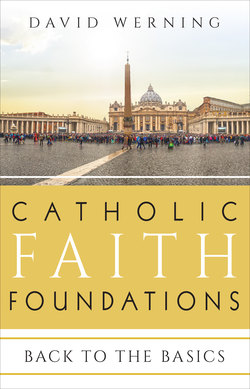Читать книгу Catholic Faith Foundations - David Werning - Страница 5
На сайте Литреса книга снята с продажи.
ОглавлениеForeword
As editor of Our Sunday Visitor Newsweekly, I see up close what topics resonate with our Catholic readers. This resonance is measured in responses to articles and other content via online comment, a letter to the editor, high social media engagement, or a request to share content with a faith community, such as reprinting an article in a parish bulletin.
Without fail, OSV Newsweekly consistently receives an overwhelming response when we print content that focuses on the basics of the Faith. So many are thirsting to learn more about the Church’s teachings, traditions, and 2,000-year history. Sometimes it’s because they are seeking clarity about a specific teaching that they know something about but would like to better understand. Sometimes it’s because they want to share a primer on a specific piece of doctrine with a loved one. Sometimes it’s because others have asked them: “Why do Catholics …?” and they feel their own response was unsatisfactory. They begin searching for an answer.
The unhappy truth is that, as others have said before, while many Catholics in recent decades have been “sacramentalized,” they really haven’t been “catechized” or “evangelized.” That is, while they may have been baptized, and likely have received the Sacraments of Reconciliation, First Communion, and Confirmation, they never properly learned Church teaching or its rationale on a whole host of issues. Moreover, many Catholics have not been taught how to cultivate a relationship with Jesus Christ — or even that it is important to do so.
Perhaps even more troubling is the perpetuation of a lack of catechesis into the next generation. A couple of years ago, the Center for Applied Research in the Apostolate (CARA) at Georgetown University released a study sponsored by Holy Cross Family Ministries, an organization that promotes family prayer around the world. This study found that only twenty-two percent of Catholic parents go to Mass every Sunday. Of those, only forty-two percent send their children to religious education — meaning that the extent of formal education in faith for the majority of the current young generation who actually attend weekly Mass is only the one hour a week they spend at liturgy. This is far from ideal.
In fact, this problem sparked such a note of concern at the Synods of Bishops on the Family in 2014 and 2015 that Pope Francis chose to devote much of his post-synodal apostolic exhortation, Amoris Laetitia, to encouraging increased catechesis for engaged couples, married couples and children (to which he devotes all of the document’s Chapter 7).
The harsh truth is that parents are the primary educators of the faith for their children, but they cannot pass on what they do not know. Pope Francis refers to this challenge in Amoris Laetitia:
“Handing on the faith presumes that parents themselves genuinely trust God, seek him and sense their need for him, for only in this way does ‘one generation laud your works to another, and declare your mighty acts’ (Ps 144:4) and ‘fathers make known to children your faithfulness’ (Is 38:19). This means that we need to ask God to act in their hearts, in places where we ourselves cannot reach” (287).
In light of these challenges, and rather than wringing our hands at the current state of catechesis, OSV Newsweekly identified an opportunity. We determined that we would go back to basics — the basics of the Faith — and offer a series that would be able to respond to the need for more catechesis. To do so, we commissioned a twelve-part series, authored by David Werning, called “Foundations of Faith,” which ran once a month in OSV Newsweekly throughout 2017. Werning has an S.T.B. in sacred theology from the Catholic University of America. He has been writing about the Church and the Catholic faith since 1992.
The series starts at the very beginning, exploring the Church from her basic foundation of “one, holy, Catholic and apostolic,” the “four marks of the Church” given in the Nicene Creed recited each Sunday at Mass. From there, the series presents how God reveals himself through creation, the significance of both Scripture and Tradition, the mystery of the Trinity, what it means to be a member of the Church, the meaning of vocation, morality, and conscience. The final third of the series explores the call to love, what it means to pray, understanding the Communion of the Saints, and an exploration of the four “last things.” The results have been compiled in this book, Catholic Faith Foundations, and each chapter has received a nihil obstat.
This book is appropriate for all people wishing to learn more about the Faith: whether it’s those who already are familiar with the Church’s teachings, but are in need of a “refresher course,” or those who are starting from the beginning.
One other thing to note: While the content is on the “basics” of the Faith, there is serious “meat” to the bones of this book. It gives not only the “what” of the Faith but also the “why” — and it ties it all into a comprehensive understanding of what it means to be Catholic. As one reader said, the series is “an excellent resource for knowledge of our Catholic faith.”
For more than one hundred years, Our Sunday Visitor has been a leader in the field of catechesis, giving readers content that helps explain what the Church teaches and why. Catholic Faith Foundations is a part of that long legacy. I pray that it brings you closer to Christ.
Gretchen R. Crowe
Editor-in-Chief
OSV Newsweekly
